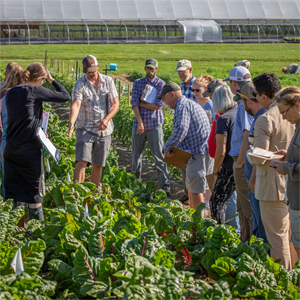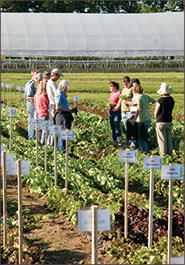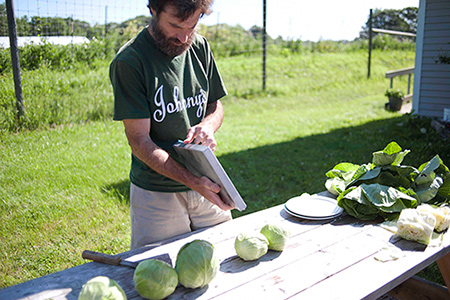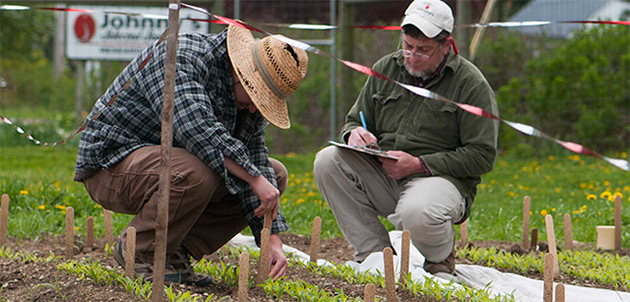- Johnny's Research Farm | Breeding, Trialing, Selection & Quality Assurance
- Johnny’s OP Stewardship Project: Restoration of ‘Hungarian Hot Wax’ Pepper
- Open-Pollinated Revival Project: 3 Improved OP Heirloom & Heritage Tomatoes
- A Brief History of Tool Development at Johnny's | Planting the Seed of a Small-Scale Farming Revolution
- Classical Plant Breeding at Johnny's | by Rob Johnston, Jr, Plant Breeder (Retired) & Founder of Johnny's Selected Seeds
- 5 JSS-Bred Varieties Introduced by Rob Johnston, Jr., Plant Breeder & Founder (Retired), Johnny's Selected Seeds
- 3 for 2020: New Johnny-Bred Stories by Rob Johnston, Jr. | ‘Starry Night,’ ‘Citrine’ & ‘Pipsqueak’
- Classical Plant Breeding at Johnny's Selected Seeds | Infographic
- About Johnny's Variety Trialing Program
- Seed Variety Trialing – Why Try Something New?
- Seed Variety Trialing at Johnny's Selected Seeds | Infographic
- How to Conduct a Scale-Appropriate Trial on Your Own Farm
- All-America Selections Award-Winning Varieties Bred by Johnny's | Spec Sheet
- Varieties Bred by Johnny's | 4-pp Brochure
- About Johnny's | PDF
- Johnny's Announces 'Rhubarb Supreme' | New Bolt-Resistant Strain of a Favorite, Open-Pollinated Swiss Chard | Press Release
- Johnny's Corno di Toro Peppers Rule | Press Release
- Pea Selection at Johnny's | The Story of 'Sugar Ann' Snap Pea
- The Johnny's Advantage | PDF
- Video: Classical Plant Breeding at Johnny's
- Video: 'Cherry Bomb' | JSS-Bred Organic Cherry x Grape Tomato from Johnny's
- Video: Johnny's Trialing Program
- Video: Hand-Pollinating Peppers at Our Research Farm | Classical Plant Breeding at Johnny's Selected Seeds
- Video: 'Clementine' | The Tangerine-Colored, Organic Cocktail Tomato from Johnny's Breeding Team
- Johnny’s Selected Seeds Observes 50th Anniversary | Press Release
- Johnny's Welcomes Kevin L Cook, PhD as VP of R&D | Press Release
- Video: Restoration of OP 'Hungarian Hot Wax' Pepper | Exclusively from Johnny's Selected Seeds
- Farm Tours of Johnny's Research & Trialing Farm
Seed Variety Trials at Johnny's Selected Seeds
About Our Trialing Program
Johnny's introduces new varieties every year, and we are often asked how we choose which new seeds to offer our customers. It's a fairly complex process, because everything we sell has been trialed on Johnny's Research Farm — and in many cases at farms around the country or globe — before we make the decision to add it to our product line. Here is an overview of the process whereby people, information, and trialing methodology work together each year to identify new products that meet the high-performance standards necessary for your success.
People Plus Information

Many people contribute to our trialing process. Johnny's keeps a close ear to the ground on the fresh market — listening for consumer preferences, trends, new products spotted elsewhere, and emergent research.
Growers far and wide let us know their needs from a production standpoint. They may, for example, request better heat, drought, wind or frost tolerance, increased disease resistance, longer storage life, or other attributes.
This kind of valuable customer feedback is typically funneled through our Territory Sales Team to the Trialing Team, where all the background information gets gathered for further consideration.
Major roles and responsibilities fulfilled by Johnny's Trialing Team include:
- Trial Technicians, who are responsible for evaluating specific crops each year.
- Breeders, who develop in-house varieties.
- Product Managers, who coordinate the production and business aspects of new introductions.
Our 7-Step Trialing Process

From start to completion, the course that a seed trial can take is highly variable. On the whole, however, the trialing process generally involves 7 key steps:
- Discovery. The Trialing Team meets in late fall or winter to discuss trial goals for the following year. Goals are conceptualized with a wide range of input. The Sales Team provides vital information about emerging trends, customer feedback, and top-performing varieties. Johnny's Breeder Team discusses the plants they are developing. Outside vendors bring forward their new commercial and experimental varieties for inclusion in our trials. The Product Development team also reviews any available published research which may help guide the trial goals; a good example is the Organic Breeding Needs Assessment published by Cornell University.
Trial Technicians discuss the results of previous trials, and suggest additional varieties they have been hearing about through their own research.
- Establishing Priorities. All this input results in a long list of varieties that Johnny's would consider trialing. Naturally, our time, staff, and space have their limitations, so priorities must be established. Taking priorities into close consideration, the Trialing Team develops a list of specific varieties that can be grown on the Research Farm within the next year. They also produce a list of key attributes they are seeking for specific crops, for example, "early-maturing bell peppers" or "large, pink beefsteak tomatoes."
- Acquiring & Logging Seed Assets. Next, the Trialing Team sends their lists to seed breeding houses large and small, both here in the US and abroad. As the seed samples arrive, they are logged into a database that is used to collect a broad spectrum of information about each variety.
- Planting & Tending Trials. When the season arrives, the Trial Techs take up management of the trials. They always grow well-known varieties (called checks or controls in seed industry parlance) alongside the varieties being trialed for comparison. All aspects of production are scheduled, from seed starting in the greenhouse to working with the farm manager on field preparations and planting.
- Evaluation & Analysis. Once the crops are established, the Trial Technicians continue to closely examine and evaluate them throughout the growing cycle. They observe and record numerous criteria, including flavor, disease development, color, size, shape, yield, and many other characteristics. They also receive valuable feedback during weekly Crop Walks and Field Forums with Johnny's staff.
Sometimes, a new variety performs so well in trials that it becomes obvious it should be available from Johnny's. Most of the time, though, decisions are not so clear-cut. A proposed new variety might have some advantage over a current variety, but not be overwhelmingly superior. Or it may have come into the trials on the recommendation of farmers, yet not perform well at Johnny's Research Farm. In such cases, the Trialing Team adds it to the list of varieties to retrial the following year. Or, it may perform in our repeat trials as a suitable substitute for a popular variety that experiences cyclical seed shortages, in which case we may provide an option, should there be a crop failure or the variety becomes difficult to source for any other reason. Brassica Product Manager/Trialing Technician Steve Bellavia scores the cabbage trial.
Brassica Product Manager/Trialing Technician Steve Bellavia scores the cabbage trial.
- Drawing Conclusions. Early fall is crunch time for Johnny's Trialing Team. They must review their observations and decide which varieties to recommend for the new catalog, which goes to press in November. It's a tight window of time, and there can be a bit of a tug-of-war as people advocate for their favorites. At that point, the decision is deferred to the Product Managers, who have to consider all the valid input they've received from the trials crew, and investigate any behind-the-scenes factors that might determine whether a variety should be added, such as seed availability, price, and quality.
- Introductions. Finally, by early October, the decisions have been made, the catalog descriptions written, and the seeds ordered.
Then it's time to start again!
Learn More
Learn more about trialing new crop varieties from the following additional resources.
- Why Try Something New? Reasons for trying out new varieties; how best to choose new products to suit your changing needs; and points to consider as you adopt new varieties on your farm.
- How to Conduct a Variety Trial on Your Farm. Conduct scale-appropriate trials that deliver results you can use, with this concise, stepwise guide from Johnny's Trialing Team.
- Greenhouse Variety Trialing at Johnny's Characteristics we look for in greenhouse varieties, and recommendations for optimal greenhouse performance.
- Learn more about advanced and replicated variety trialing programs for organic crops by visiting the website of the Organic Seed Alliance.
- Browse All New Products.
Much of what makes our work so compelling rests in the diversity and possibility inherent in growing things.
Yet, whether we are looking for one new key attribute or a whole complement in trialing a new vegetable, fruit, or herb variety, the one constant we seek is superior eating quality.
That is why our Product Techs taste every variety being considered for introduction to the catalog and regularly hold tastings with others as well. With crops where flavor is highly subjective, such as tomatoes, carrots, microgreens, and winter squash, we have panels of JSS employees taste the varieties to make final decisions.
Whatever differentiators you're looking for in the produce you grow, we want you to be sure to find flavor at the top of the list with Johnny's Selected Seeds.


